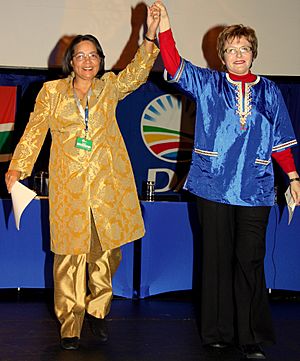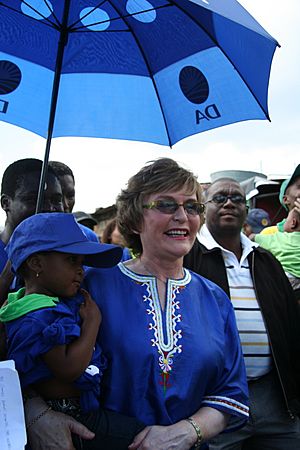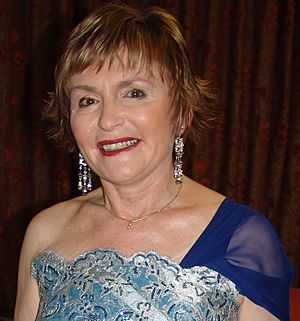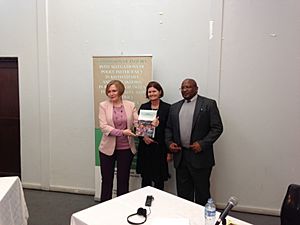Helen Zille facts for kids
Quick facts for kids
Helen Zille
|
|
|---|---|
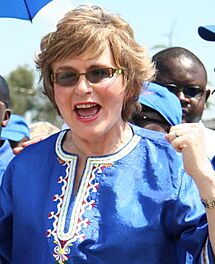
Zille visiting Mpumalanga in January 2011
|
|
| Chairperson of the Federal Council of the Democratic Alliance | |
| Assumed office 20 October 2019 |
|
| Deputy | Annelie Lotriet Thomas Walters James Masango Ashor Sarupen |
| Leader | John Steenhuisen Mmusi Maimane |
| Preceded by | James Selfe |
| Federal Leader of the Democratic Alliance | |
| In office 6 May 2007 – 10 May 2015 |
|
| Preceded by | Tony Leon |
| Succeeded by | Mmusi Maimane |
| 7th Premier of the Western Cape | |
| In office 6 May 2009 – 22 May 2019 |
|
| Preceded by | Lynne Brown |
| Succeeded by | Alan Winde |
| Mayor of Cape Town | |
| In office 15 March 2006 – 30 April 2009 |
|
| Deputy | Grant Haskin |
| Preceded by | Nomaindia Mfeketo |
| Succeeded by | Grant Haskin (acting) Dan Plato |
| Member of the National Assembly of South Africa | |
| In office 14 April 2004 – 15 March 2006 |
|
| Constituency | Western Cape |
| Member of the Western Cape Provincial Parliament | |
| In office 6 May 2009 – 7 May 2019 |
|
| Director of Communications and Public Relations at the University of Cape Town | |
| In office 15 June 1999 – 13 April 2004 |
|
| Personal details | |
| Born |
Otta Helene Zille
9 March 1951 Johannesburg, Transvaal, South Africa |
| Political party | Democratic Alliance (2000–present) |
| Other political affiliations |
Democratic Party (before 2000) |
| Spouse |
Johann Maree
(m. 1982) |
| Children | 2 |
| Residences | Cape Town, Western Cape, South Africa |
| Alma mater | St Mary's School, Waverley University of the Witwatersrand |
| Occupation |
|
| Profession | Journalist |
Otta Helene Maree (née Zille /ˈzɪlə/; born 9 March 1951), known as Helen Zille, is a South African politician. She has served as the Chairperson of the Federal Council of the Democratic Alliance since 20 October 2019. From 2009 until 2019, she was the Premier of the Western Cape province for two five-year terms, and a member of the Western Cape Provincial Parliament. She served as Federal Leader of the Democratic Alliance from 2007 to 2015 and as Mayor of Cape Town from 2006 to 2009.
Zille is a former journalist and anti-apartheid activist and was one of the journalists who exposed the cover-up around the death of Black Consciousness leader Steve Biko while working for the Rand Daily Mail in the late 1970s. She also worked with the Black Sash and other pro-democracy groups during the 1980s. In the political arena, Zille has served in all three tiers of government, as the Western Cape's education MEC (1999–2001), as a Member of Parliament (2004–2006), as Mayor of Cape Town (2006–2009), and as Premier of the Western Cape (2009–2019).
Zille was selected as World Mayor of the Year in 2008. She was also chosen as Newsmaker of the Year 2006 by the National Press Club in July 2007. Zille speaks English, Afrikaans, Xhosa, and German.
Following her departure from the premiership in May 2019, she joined the South African Institute of Race Relations as a senior policy fellow in July 2019, though she suspended her fellowship in October 2019. She started her own podcast, Tea with Helen, in August 2019. Zille declared her candidacy for Federal Council Chairperson of the DA in October 2019. She won the election.
Contents
Early life and career
Early years, education and family
Helen Zille was born in Hillbrow, Johannesburg, the eldest child of parents who separately left Germany in the 1930s to avoid Nazi persecution due to the fact that her maternal grandfather and paternal grandmother were Jewish.
Zille was believed to be the grandniece of the Berlin painter Heinrich Zille. She gave corresponding hints by herself in the past but withdrew them in her autobiography published in 2016. The Berlin genealogist Martina Rhode had documented before that there was a mix-up in the handwritten notes of her uncle Heinrich between people with the same name but different birthplaces and dates of birth.
Her mother was a volunteer with the Black Sash Advice Office. While her family lived in Rivonia, she was educated at Johannesburg's St Mary's School, Waverley, one of the city's private education schools. She studied at the University of the Witwatersrand, where she obtained a Bachelor of Arts degree. Around 1969, she joined the Young Progressives, the youth movement of the liberal and anti-apartheid Progressive Party.
She married Professor Johann Maree in 1982, and they have two sons. She is a member of the Rondebosch United Church in Cape Town.
Political journalism
Zille began her career as a political correspondent for the Rand Daily Mail newspaper in 1974. During September 1977, the South African Minister of Justice and the Police J.T. Kruger announced that anti-apartheid activist Steve Biko had died in prison as the result of an extended hunger strike. Zille and her editor Allister Sparks were convinced Kruger's story was a cover-up, and Zille obtained concrete proof of this after tracking down and interviewing doctors involved in the case.
Consequent to the publication of the story, headlined "No sign of hunger strike—Biko doctors", Minister Kruger immediately threatened to ban the newspaper, and Zille received death threats. Zille and Sparks were represented at the subsequent quasi-judicial Press Council by defence lawyer Sydney Kentridge. The two were found to be guilty of "tendentious reporting", and the paper was forced to issue a correction. Kentridge later helped confirm the accuracy of Zille's account when he represented the Biko family at the inquest into his death. That inquest found Biko's death had been the result of a serious head injury but failed to find any individual responsible.
Zille resigned from the Rand Daily Mail along with editor Allister Sparks, after the paper's owner, Anglo American, demanded that Sparks quiet the paper's equal rights rhetoric.
Anti-apartheid movement
Zille was heavily involved in the Black Sash movement during the 1980s. She served on the regional and national executives of the organisation, and was also vice-chair of the End Conscription Campaign in the Western Cape. During this time, she was arrested for being in a "group area" without a permit and received a suspended prison sentence. Zille and her husband later offered their home as a safe house for political activists during the 1986 State of Emergency, and she was temporarily forced into hiding with their two-year-old son.
Zille was also actively involved in the South Africa Beyond Apartheid Project and the Cape Town Peace Committee. She later gathered evidence for the Goldstone Commission which investigated attempts to destabilise the Western Cape before the elections in 1994.
Education policy work
Zille formed a public policy consultancy in 1989, and in 1993 she was offered the position of Director of Development and Public Affairs at the University of Cape Town. During this time Zille also chaired the governing body of Grove Primary School, and in 1996 led a successful challenge against government policy limiting governing bodies' powers to appoint staff.
Zille was then invited by the Democratic Party (now the Democratic Alliance) to write a draft policy for Education in the Western Cape. In 1999 she became a Member of the Western Cape Provincial Legislature and was appointed MEC for Education.
In 2004, Zille became a Member of Parliament with the DA. Within the DA, she rose to the level of deputy federal chairperson and served as national party spokesperson and spokesperson for education.
Mayoralty
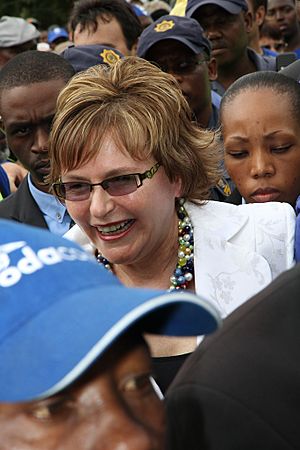
2006 municipal elections and aftermath
In the 2006 municipal elections, the DA became the single largest party in Cape Town with 42.0% of the vote, ahead of the African National Congress (ANC). Zille was elected mayor by 106 votes to 103 on 15 March 2006, after the DA obtained the support of several smaller parties.
Subsequently, Zille's multi-party government decided to revoke the appointment of Cape Town City Manager Wallace Mgoqi, whose term of appointment had been extended by the outgoing ANC executive mayor, Nomaindia Mfeketo. Zille's decision was upheld by the High Court, which ruled that the extension of Mgoqi's appointment by the previous mayor had been unlawful.
Zille has faced considerable opposition and confrontation from the ANC. In September 2006, the provincial ANC MEC Richard Dyantyi announced that he planned to replace the city's mayoral system with an executive committee. The move would have resulted in reduced mayoral power, and the governing party would not itself have been able to assign the ten seats on the committee, which would instead have been allocated on a proportional representation basis. Dyanti and Zille agreed to retain the current mayoral system if the ANC were provided with two additional sub-committees in areas of the city controlled by the ANC. The matter was thus resolved.
Issues
Zille's commitments as mayor included Cape Town's role as a designated host city for the 2010 World Cup, as well as the construction and financing of the Cape Town Stadium, which hosted 8 FIFA World Cup football matches in 2010.
Zille objected to plans to incorporate the metro police into the broader police service, arguing that such a move would remove considerable power from local government and vest more control in the hands of the National Police Commissioner at the time, Jackie Selebi, who was later convicted of corruption.
Achievements
Housing and service delivery
Although provincial rather than local government is tasked with housing delivery, Zille claimed that her municipality's efforts to reform housing lists and improve verification processes also allowed housing delivery to be increased from 3000 units per annum under the ANC, to 7000 units per annum between 2006 and 2008 under her administration as mayor.
In an article titled "The ANC is pro-poverty not pro-poor" published shortly before the 2009 general election, Zille pointed out that no budget allocation existed for upgrading informal settlements under the ANC administration, whereas in 2007 her administration had set a dedicated budget for the provision of water, electricity, and sanitation.
DA Leader
Election
On 15 March 2007, Zille declared herself a candidate to succeed outgoing leader of the DA, Tony Leon. A favourite from the start, with backing from the Western Cape, Gauteng, KwaZulu-Natal, Mpumalanga, the Northern Cape, the Free State and even the Eastern Cape (regarded during much of the build-up as the stronghold of main rival Athol Trollip), she was elected as the new leader by a large majority on 6 May 2007. She indicated that she would lead the party from outside Parliament, while continuing in her position as executive mayor of Cape Town.
Issues
When she became the leader of the DA, Zille challenged the majority government on several issues.
Health
Zille warned against the controversial National Health Amendment Bill, legislation allowing greater state intervention in private health care. She warned that the state would destroy the system. She outlined the possibility that the Bill could drive away thousands of skilled medical professionals. Together with her political party she proposed an alternative health plan for the privatisation of state healthcare. The National Health Amendment Act became law in 2013, providing for the establishment of a new Office of Health Standards Compliance.
Judicial independence
As DA leader, Zille has also frequently questioned judicial independence in South Africa, in light of the alleged behaviour of the Cape judge president John Hlophe in trying to influence the Constitutional Court judges to rule in favour of ANC president Jacob Zuma. She also cited racism directed towards those in the judiciary, and has criticised the perceived double standards vocally.
Political debate
In June 2008, she challenged the president of the ANC and the 2009 presidential candidate, Jacob Zuma to a public debate on ten key issues such as the arms deal, disbanding of the Scorpions, the situation in Zimbabwe, HIV/AIDS and labour legislation. Zuma declined to participate.
United Nations
In April 2008, Zille was asked to address the United Nations in New York City on population and development, offering her experience and lessons as mayor of Cape Town.
Zille is a supporter of the Campaign for the Establishment of a United Nations Parliamentary Assembly, an organisation which campaigns for democratic reformation of the United Nations; she believes that it is necessary as it will "ensure that the citizens of every country feel more connected to the UN and its programmes".
World Mayor award
Zille was the winner of the 2008 World Mayor Award in October 2008, out of 820 world mayors nominated. The ruling ANC used its majority in the National Assembly to block a motion by the DA acknowledging Zille's achievement in winning the award.
Resignation as Party Leader
In April 2015, Zille announced that she would not be standing for re-election as party leader.
Premier of the Western Cape
2009 election
The 2009 general elections presented Zille with her first major electoral contest as leader of the DA. She was selected as the candidate for Premier of the Western Cape, and her party succeeded in winning a 51.46 percent of the province's vote. Zille was installed as Premier, and replaced as mayor by Dan Plato. Nationally, the DA gained significant ground as official opposition, winning 16.66 percent of the vote, and increasing its tally of seats in both houses of Parliament to 80.
2014 elections and re-election
Ahead of the 2014 elections, in 2013, Thembu King Dalindyebo joined the DA as an ordinary member while he was appealing convictions for various crimes, which was seen by some as a cynical ploy by the DA to court voters. When confronted about the membership, Zille noted that no other ordinary members were subject to tests or "due diligence" investigations, but also that the DA's constitution required Dalindyebo's membership to be terminated if his appeals failed. In October 2015, Dalindyebo's convictions were upheld, and his membership of the DA was terminated.
Following the 2014 general elections, the DA won 59.38% of the vote and 26 seats in the Western Cape provincial legislature, an increase of 3.25%. Under her leadership, the party also won 89 seats in the National Assembly and 22.23% of the National vote. Zille was sworn into a second term on 26 May with 27 votes out of 42, her opponent being Marius Fransman of the ANC.
Succession as premier
In September 2018, the Democratic Alliance announced that it had selected Alan Winde to be the party's Western Cape Premier candidate for the 2019 South African general election. The other candidates nominated for the position were Fazloodien Abrahams, Bonginkosi Madikizela, David Maynier, Kelly Baloyi, Jacobus MacFarlane and Micheal Mack. Zille was constitutionally barred from running for a third term as premier, as the South African constitution prohibits a premier from serving more than two consecutive terms. Following the May 2019 general election, the Democratic Alliance retained its majority in the Western Cape Provincial Parliament. Zille left office on 22 May 2019.
Later career
Joining the IRR
Following her leaving public office in May 2019, it was revealed in July 2019, that she had joined the South African Institute of Race Relations (SAIRR) as a senior policy analyst. The SAIRR said upon the announcement: "The joining of forces between Ms Zille and the IRR brings together two of the loudest reformist voices in the country." The institute soon published an opinion column in September 2019, calling for Maimane to be sacked as DA leader and replaced with Alan Winde. Senior DA officials denounced the opinion piece, though Zille defended it. She soon suspended her IRR fellowship in October 2019.
Tea with Helen
Zille formed her own podcast, Tea with Helen, in August 2019 intending to engage in conversation with people who disagree with her political views. The podcast is aired on YouTube, iTunes and Spotify. The first guest on the show was Business Day's former editor-in-chief, Peter Bruce. Other people who have featured on the podcast include Ferial Haffajee, Max du Preez and Adam Habib. Zille tried to reach out to EFF leader, Julius Malema, but he rejected the invitation.
Federal Council Chairperson
On 4 October 2019, Zille declared her candidacy for Federal Council Chairperson of the DA, as incumbent James Selfe had announced his retirement. Zille made the announcement after she described the party as being in "distress and political turmoil". The position is similar to the role of Secretary-General of any given political party's leadership structure. The election was held later that month and Zille won it.
Personal life
Zille married Professor Johann Maree in 1982, and they have two sons. She is a member of the Rondebosch United Church in Cape Town.
Published works
- Zille, Helen (October 2016). Not Without a Fight. Penguin Books. ISBN 9781776090426
- Zille, Helen (April 2021). #StayWoke: Go Broke: Why South Africa won’t survive America’s culture wars (and what you can do about it). Independently Published. ISBN 9798727953457
See also
 In Spanish: Helen Zille para niños
In Spanish: Helen Zille para niños



